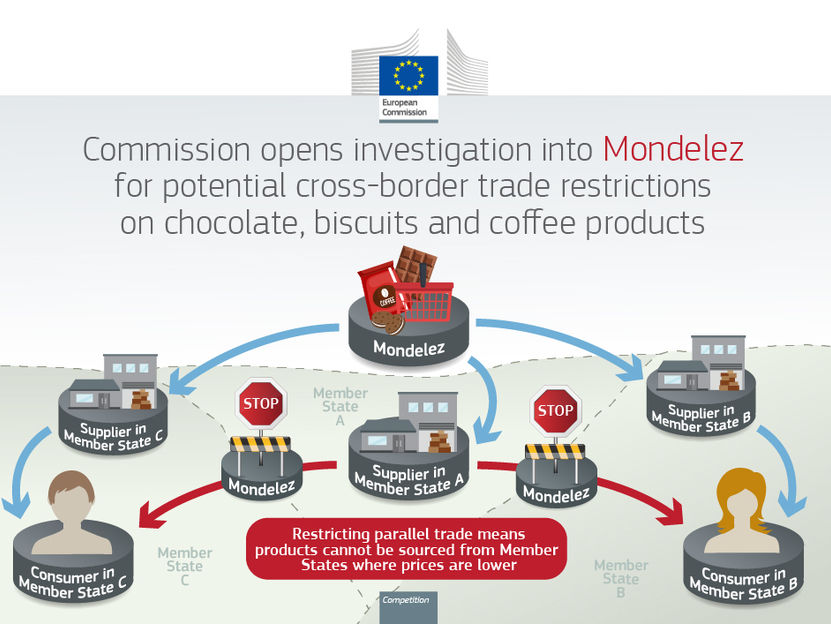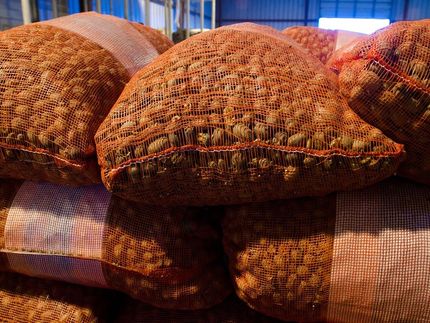Antitrust: Commission opens formal investigation into possible trade restrictions by Mondelēz
Advertisement
The European Commission has opened a formal antitrust investigation to assess whether Mondelēz has restricted competition in a range of national markets for chocolate, biscuits and coffee by hindering the cross-border trade of these products between EU Member States, which would be in breach of EU antitrust rules.

European Commission
Executive Vice-President Margrethe Vestager, in charge of competition policy, said: “Chocolates, biscuits and coffee are products consumed by European citizens daily. We are opening a formal investigation to see whether Mondelēz, a key producer of these products, might have restricted free competition in the markets concerned by implementing various practices hindering trade flows, ultimately leading to higher prices for consumers. Trade in the internal market can lower prices and increase the variety of products offered across Member States. ”
Mondelēz is one of the largest producers of chocolate, biscuits and coffee in the European Union. The markets for the sales of these products are worth tens of billions of Euros every year.
The Commission is concerned that Mondelēz may have restricted the so-called ‘parallel trade' of its chocolates, biscuits and coffee between EU Member States through agreements and unilateral practices. Traders and retailers try to procure products in the internal market where the prices are lower and trade them to markets where prices are higher. This generally leads to price decreases in countries where prices are higher. Restrictions to such parallel trade can lead to the isolation of a national market whereby the manufacturer or supplier can charge higher prices to the detriment of consumers. Restrictions to parallel trade can also lead to less product diversity.
In particular, the Commission will investigate certain potentially anti-competitive practices by Mondelēz including:
-
Possible limitations of the sales territories within the EU through agreements that determine in which Member State a trader can or cannot sell the products, or that restrict passive sales;
Possible curtailing of parallel trade through agreements that raise prices or limit volumes specifically for customers that trade the products across Member States;
Possible agreements with customers not to engage in parallel trade or not to procure products from parallel trade, inter alia, in exchange for payments or other forms of compensation;
Possible restrictions on the languages used on packaging either unilaterally or through agreements with traders, thereby creating friction on sales to certain other EU Member States;
Possibly refusing to supply certain traders with a view to restricting imports into certain markets.
If proven, the agreements and practices under investigation may create anticompetitive obstacles to trade within the EU Internal Market in breach of Articles 101 and/or Article 102 of the Treaty on the Functioning of the European Union (TFEU).
The Commission will now carry out its in-depth investigation as a matter of priority. The opening of a formal investigation does not prejudge its outcome.
Background
As part of its own-initiative investigation of suspected anti-competitive practices covering the EU, the Commission carried out unannounced inspections at the premises of Mondelēz in November 2019. .
Citizens, Member States' competition authorities and the European Parliament have repeatedly voiced concerns that prices for common food and drink products can significantly vary between EU Member States including between neighbouring Member States. They have also alleged that operators raise obstacles to trade from Member States where products are cheaper to Member States where products are more expensive (so-called parallel trade). They have therefore called upon the Commission to address these obstacles and ensure more convergence of prices inside the EU Internal Market.
In November 2020, the Commission published a study on territorial supply constraints in the EU retail sector. The study also suggests that certain suppliers implement a number of practices that restrict the parallel trade of groceries, to the disadvantage of European consumers.
Background on antitrust investigations
Article 101 of the TFEU prohibits anticompetitive agreements and decisions of associations of undertakings that prevent, restrict or distort competition within the Internal Market. Article 102 TFEU prohibits the abuse of a dominant market position. Article 102 of the TFEU prohibits the abuse of a dominant position. The implementation of these provisions is defined in the EU Antitrust Regulation (Council Regulation No 1/2003), which can also be applied by Member States' competition authorities.
Article 11(6) of Regulation 1/2003 provides that the opening of proceedings by the Commission relieves the competition authorities of the Member States of their competence to apply EU competition rules to the practices concerned. Article 16(1) further provides that Member States' courts must avoid adopting decisions, which could conflict with a decision contemplated by the Commission in proceedings it has initiated.
The Commission has informed Mondelēz and the competition authorities of the Member States concerned that it has opened proceedings in this case.
There is no legal deadline for bringing an antitrust investigation to an end. The duration of an investigation depends on a number of factors, including the complexity of the case, the cooperation of the undertaking with the Commission and the exercise of the rights of defence.
























































